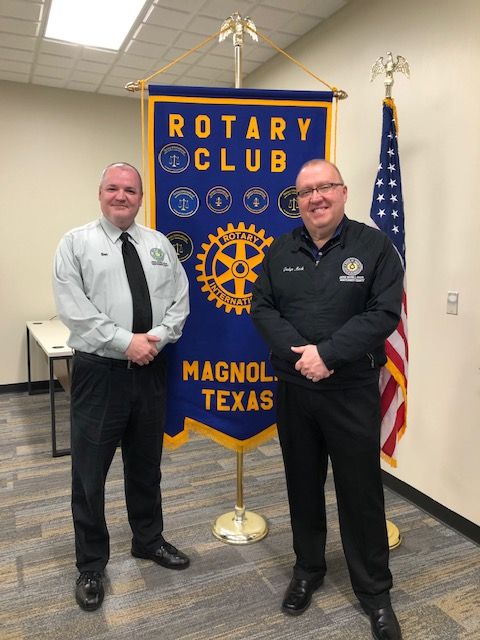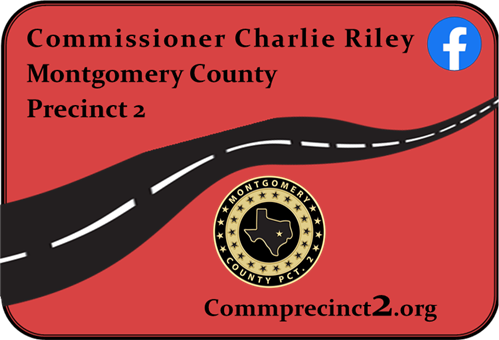
On 11/12/2019, Judge Wayne Mack (Justice of the Peace, Court 1, Montgomery County, Texas) spoke to the Magnolia Rotary Club membership about suicide prevention. Pictured above from left to right are: Ben Blair (Juvenile Case Manager) and Judge Wayne Mack
Magnolia Rotary Club President Janice Thigpen introduced Judge Wayne Mack and told everyone about how Judge Mack started out his career as a janitor and worked himself up through the ranks to his current position. Janice stated that Judge Mack has said that he always tells people his memoir is going to be called, "From Janitor to Judge and all the mess I cleaned up along the way".
Judge Mack, using a slide presentation made the following points about suicide within Montgomery County:
- Texas now ranks as 49th nationwide in spending on mental health. It was 48th last year.
- The suicide rate in Montgomery County, Texas has doubled since last year.
- In the U.S., suicide is the 10th leading cause of death. In the world, over 800,000 people die by suicide each year.
- Don't say that someone "committed suicide". Instead, say they "ended their life" or "killed themselves".
- Suicide is a health issue and should be treated as any other health issue.
- Today, suicide has a stigma associated with it and this prevents many people from getting the professional help they need.
Judge Mack said that some people are more at risk for suicide than others. There are three types of risk factors that increase the chance that a person may try to take their life:
- Health Factors:
- Mental Health Conditions
- Depression
- Substance use disorders
- Bipolar disorder
- Schizophrenia and psychosis
- Personality traits of aggression, mood changes and poor relationships
- Conduct disorder
- Anxiety disorders
- Serious or chronic health condition and/or pain
- Traumatic brain injury
- Environmental Factors
- Access to lethal means including firearms and drugs
- Prolonged stress, such as harassment, bullying, relationship problems or unemployment
- Stressful life events which may include a death, divorce or job loss
- Exposure to another person's suicide, or to graphic or sensationalized accounts of suicide
- Historical Factors
- Previous suicide attempts
- Family history of suicide
- Childhood abuse, neglect or trauma
Judge Mack also spoke about suicide warning signs. He stated that there are three types suicide warning signs:
- Talk. If a person talks about:
- Killing themselves
- Feeling hopeless
- Having no reason to live
- Being a burden to others
- Feeling trapped
- Unbearable pain
- Behavior. Behaviors that may signal risk, especially if related to a painful event, loss or change:
- Increased use of alcohol or drugs
- Looking for a way to end their lives, such as searching online for materials or means
- Withdrawing from activities
- Isolating from family and friends
- Sleeping too little or too much
- Visiting or calling people to say goodbye
- Giving away prized possessions
- Aggression
- Fatigue
- Mood. People who are considering suicide often display one or more of the following moods:
- Depression
- Anxiety
- Loss of interest
- Irritability
- Humiliation
- Agitation
- Rage
Judge Mack told everyone that they should assume you are the only one who will reach out. If you are concerned about someone, talk in private. Listen to their story and let them know you care. Ask directly about suicide calmly and without judgement. Show understanding and take their concerns seriously. Let them know that their life matters to you. However, you should avoid the following:
- Debating the value of life
- Advice to fix it
- Minimizing the person's feelings
Judge Mack also handed out pamphlets from the American Foundation for Suicide Prevention which also listed the following resources:
- Visit your Primary Care Provider, Mental Health Professional, Walk-in Clinic, Emergency Department or Urgent Care Center
- Find a mental health provider at https://findtreatment.samhsa.gov or https://mentalhealthamerica.net/finding-help
- National Suicide Prevention Lifeline at 1-800-273-8255. Judge Mack suggested that everyone add this phone number to their phone list.
- Text TALK to 741741. Text with a trained crisis counselor from the Crisis Text Line for free, 24/7.
- Call 911 for emergencies.
For additional information, go to https://afsp.org/.





